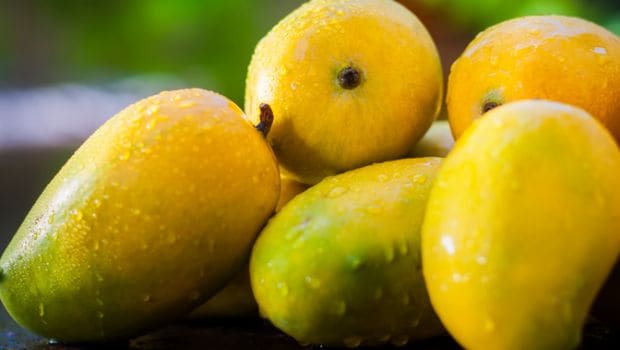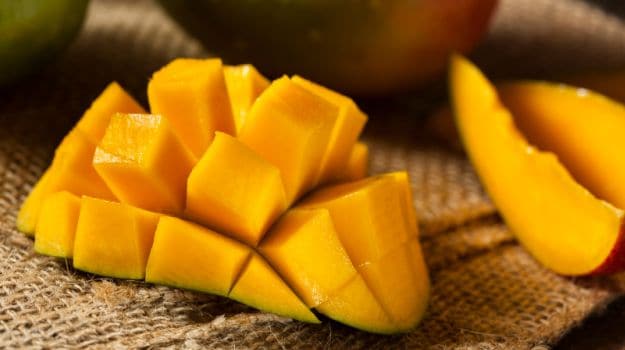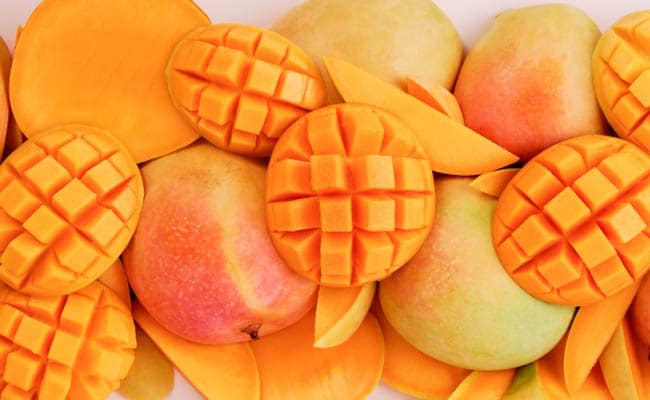Mango is High on Calories, But Does it Mean it is Unhealthy?
According to our expert nutritionist, Dr. Rupali Datta, "Mango is very high on calories as compared to other fruits like banana, watermelon or grapes. However, it also has a high nutrient value, which is generally overshadowed by the calories it has. It is high on beta-carotene, which is an excellent antioxidant source for our body."(Also read: Does Mango Make you Gain Weight?)

Mango is high on calories, but if eaten in control, it can prove to be very healthyAccording to Dr. Rupali, "we generally set calories of a fruit or vegetable as a benchmark to consider it healthy or unhealthy. The calorific value of a mango is about 2 calories per gram, so if we consume about 100 grams of mango, we consume about 200 calories, which is about having two bananas that have 74 calories each. As far as watermelon is concerned, it has approximately 85 percent of water in it, hence the calorie count automatically decreases, which is about 30 calories per 100 gram. Grapes have around 67 calories per 100 grams, which clearly means that mangoes have way more calories than any other fruit, which is why people construe it as an unhealthy fruit. So the misconception of mangoes being unhealthy comes from their calorific counts that overshadow the nutrient value they contain."
According to the book Healing Foods by DK Publishing House, mango has both spiritual and medicinal significance. Mangoes are high in antioxidants beta-carotene and vitamin C, and so are good for boosting immunity, protecting eyesight and aiding digestion. They also help neutralise free radical damage in the body.
(Also read: Where does the Langra Aam Get its Name From? An Interesting Take on this Most Loved Aam)

Mango has both spiritual and medicinal significanceNutrient Value of Mango Vs Other Fruits
1. Mango has High Amounts of Vitamin C
According to nutritionist Jasleen Kaur from Just Diet Clinic, "mango has more vitamin C content than an orange. Interesting, isn't it? While an orange has around 70 milligram of vitamin C, mango has a whopping 122 milligram of vitamin C. It also has abundance of zeaxanthin, an antioxidant which keeps your eyes healthy. It also helps boost your immunity preventing you from falling sick."

Mango is an excellent source of vitamin C which keeps your eyes healthy2. Mango has Abundant Amount of Vitamin A
Carrot is believed to have the highest amount vitamin A, containing more than 100 percent of it. Mango, on the other hand, has a mere 35 percent of vitamin A. However, it is believed that mango has enough vitamin A that is required to produce sebum to keep the hair moisturised. Vitamin A is necessary for the growth of bodily tissues that include hair and skin.

Mango has vitamin A that produces sebum keeping your hair healthy 3. It is Rich in Potassium
Banana is super rich in potassium as it has around 800 milligram as compared to approximately 260 milligram in a mango. Although banana wins here but a mango still has sufficient amount of potassium to meet your daily requirement. Potassium is an important component of body fluids and cells that controls your heart rate and keeps a check on your blood pressure.

Mango keeps your heart rate and blood pressure normal4. It has a Generous Amount of Vitamin B6
Avocados are one of the fruits that have the highest amount of vitamin B6; 15 percent of the fruit has it as compared to five percent (plus six percent of B vitamins) of vitamin B6 in mango. Vitamin B6 in mango plays a pivotal role in maintaining a healthy brain function, sleep cycle and mood.
Jasleen tells us that mangoes also fight cancer. It has antioxidants including fisten and gallic acid protecting the body from colon and breast cancer.

Mango can help fight cancer as it has various antioxidantsEating Mangoes is Healthy!
Mango may be considered as one of the fruits that has the highest amount of calories, however, it also makes for a healthy fruit if eaten in limited quantities. It is recommended to have one or two mangoes a day, but consuming more can take a toll on your body leading to obesity and even diabetes. Diabetics may refer to the doctor before consuming mangoes.








